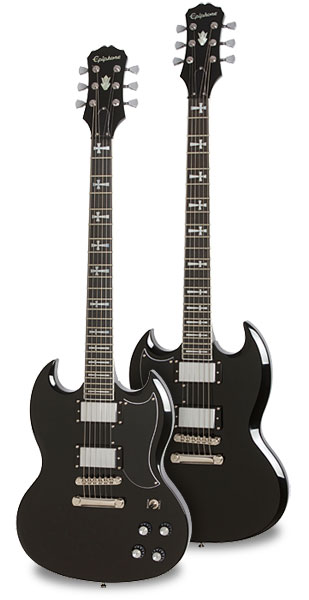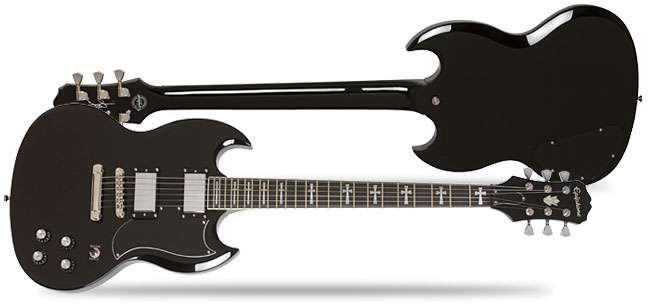Tony Iommi Discusses The End of Black Sabbath : The Epiphone Interview
Black Sabbath, perhaps the most influential rock and roll band of the last 40 years, is currently on their final tour–The End–that will take the Hall of Famers one more time around the world before their final-scheduled concert at the historic AK-Chin Pavilion in Phoenix, Arizona. Although Phoenix might seem an unlikely city for a Black Sabbath finale, for now it looks as though September 21 really will be “The End” of the band that Tony Iommi has led since 1970.
Though singer Ozzy Osbourne may be more famous to the average rock fan, Ozzy would be the first to affirm that Black Sabbath has been Tony Iommi’s band all along, and that Iommi single handedly changed the sound of rock and roll guitar in 1970 when ‘Sabbath released their debut album.
Compared to organic, earthy hits like The Beatles’ “Get Back”, The Band’s “The Weight” and the Woodstock Festival soundtrack, the four lads from Birmingham made a sound like the end of the world. Black Sabbath’s Rock and Roll Hall of Fame biography describes their pursuit of what were then unusual themes for rock–war, social chaos, the supernatural, the afterlife, and the timeless conflict between good and evil. The group was a product of the late Sixties. It was a time when youthful idealism had begun to ebb amid the war in Vietnam, the influx of hard drugs, clashes with authority figures, and the bruising realities of working-class life (low wages, grim labor) that lay ahead for many of them.”
There was nothing like the band in 1970 and today–46 years on–the album is still thrilling to hear. The sound of 70s rock–in fact the transition from rock and roll to just Rock (with a capitol “R”)– can largely be credited to Iommi, who is known by fans and writers around the world as the Godfather of Heavy Metal. Take a moment to check out the power that Iommi brought to Sabbath from the very beginning in their live performance of “War Pigs.”
Tony Iommi was born February 19, 1948 in Birmingham, England. Inspired by Hank Marvin and the Shadows, he began playing guitar (left-handed) at a teenager. After losing the tips of his right hand in an accident at his job in a sheet metal factory, a friend told a despondent Iommi how Django Reinhardt overcame the loss of his hand in a fire. So Iommi continued to study guitar with soft plastic tips at the end of his fingers and began working the group Polka Tulk (later called Earth) with bassist Terry “Geezer” Butler, drummer Bill Ward, and vocalist John “Ozzy” Osbourne. The band changed their name to Black Sabbath (the English translation of the Italian horror film “I Tre Volti Della Paura”) to avoid confusion with another band called Earth and released their debut album in 1970.
The original trio (without drummer Bill Ward) recently performed what will probably be their final concerts at Madison Square Garden in Manhattan–the scene of many previous triumphs– and both nights were sold out months ahead of time. They were in terrific form, tearing through a set list that by now virtually every audience member knows by heart. The last couple of years have been tough on the band. Ozzy Osbourne postponed several dates in January due to illness. And the band’s heart and soul, Tony Iommi, has battled cancer over the last few years. A planned full-length album with producer Rick Rubin was shelved after weeks in the studio in favor of a tour-only EP of new material and unreleased live cuts.
“We were gonna do one before the tour, but I’m 67 in December (2015), it would take three or four years to write and record an album, by which time I’ll be f-ing 73 or 72 or something,” Ozzy told rock journalist Gary Graff. “So we decided just to do a farewell tour.”
But fans will not let the band go quietly. Last spring, Tony appeared at the Epiphone booth at Musikmesse to preview his stunning Epiphone Ltd. Ed. Tony Iommi Signature SG featuring Gibson USA Tony Iommi humbuckers. And when news of his appearance got out, Musikmesse became “Iommi-fest” as fans (and exhibitors) abandoned the show to wait in line just to get a glimpse of the man who for many is the definitive rock guitarist.
Tony is a longtime friend of Epiphone, and developed his first signature model in 2005. For what will likely be his final Epiphone Signature SG, Iommi worked hard with Epiphone’s luthiers to make a jewel of guitar that was in his hands, the epitome of perfection. “This particular one is very different than the last one we did.” said Iommi of his new Epiphone Signature SG. “It’s a real classic looking guitar and it sounds great. Jack socket at the bottom. And I like the way the frets feel. This Epiphone sounds like I want it to sound on stage. And it’s got my pickups which we worked on for quite a awhile. They’re based on an original pickup that I designed way back years ago. And Epiphone and Gibson have copied it exactly. I play it at home in the studio… it’s really good.”
Epiphone spoke with Tony about his life on the inside of Black Sabbath, writing those riffs, and where the guitar might lead him next.
———————
Thanks for speaking with us, Tony. You’ve helped design and customize guitars before. What did you want to do differently with your new Epiphone Ltd. Ed. Tony Iommi Signature SG?
I wanted a top quality guitar that I would be able to use on stage and that everybody that buys one would have exactly the same as I use. I believe that the quality of my newest Epiphone is top notch. And it should certainly not be looked on as a cheap quality guitar because it is not.
You’ve had a long relationship with Epiphone and Gibson. How did that start?
I first started using the Gibson SG in 1968 when we recorded our first album, Black Sabbath. Before that I always used a Stratocaster. When we started to record our first album, I recorded one track, “Wicked World,” with the Fender and then the pickup went faulty so my spare guitar–which I had never used before and had just recently bought–was the SG. After recording the whole of the rest of the album with the Gibson SG, I never went back to the Fender again. I stuck with the Gibson SG from then on. That became our trademark sound. My relationship with Epiphone came through Gibson when I was asked to do an Epiphone Tony Iommi SG.
 In the late 60s when you first started shopping for guitars in Birmingham, did you have many options?
In the late 60s when you first started shopping for guitars in Birmingham, did you have many options?
In the late 60s, for me–being left-handed and living in the UK–there were hardly any options at all (to) finding and buying a good left-handed guitar. That’s why in the mid-60s I was lucky to find one of the few left handed guitars that I had seen.
How did you like working in the studio with Rick Rubin for13 and for Black Sabbath’s last recordings?
Recording the album 13 I really enjoyed. It was great being with all the guys and it all clicked into place. I had already written a lot of ideas before we hit the studio. It’s been a different experience from album to album. Our first albums were done very quickly and live, and as time went on, we became more experimental and we spent more time in the studio trying different ideas. All in all, I enjoy being in the studio.
When you’re on the road with Sabbath now, what do you notice has changed for the group?
We really appreciate each other’s personalities and musicianship. We have a great respect for each other that was built over many years. We’re all very appreciative and lucky to be in a position to be able to play together.
Do you think in this age where people are texting–speaking in short hand and not face-to-face–that Black Sabbath would have formed had you all had mobile phones and social media in the late 60s?
Probably not. Music was about meeting people and getting to know their personalities, getting the connection and right vibe.
Is it still easy to write for Black Sabbath or do you have to put yourself in a frame of mind to write for the band?
No. I come up with riffs all the time when I’m at home or on the road. I’m lucky to be able to do it naturally. It’s what I do. These days I’m lucky to still be able to play.
Are you surprised the band has endured so long?
No, not really. We did create something that was unique at the time. And still to this day we’ve got a very strong fanbase, sell out gigs, and still are very honoured to be at the top of our tree.
What kind of guitars do you like to play when you’re away from your SGs?
I’ve got a wide variety of guitars at home. Mostly in the house I tend to play my acoustics and in the studio I play one of my many Gibsons or Epiphones. I don’t listen to music for inspiration–my inspiration comes from within.
Epiphone

















